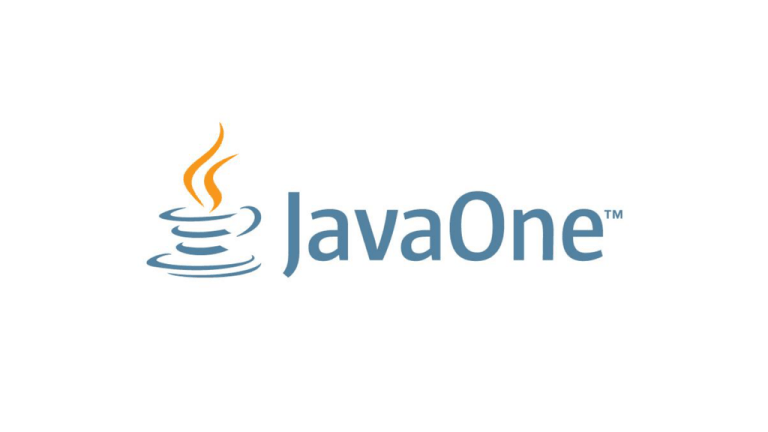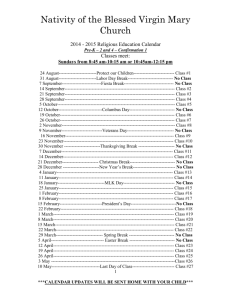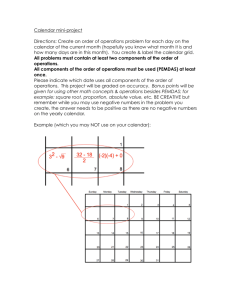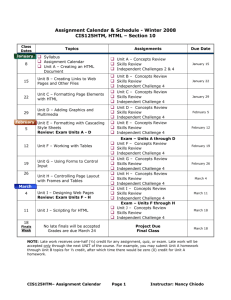
1
Copyright © 2013, Oracle and/or its affiliates. All rights reserved.
Converting to the New Date
and Time API in JDK 8
Roger Riggs Oracle
Consulting Member of Technical Staff
Sherman Shen Oracle
Principal Member of Technical Staff
Stephen Colebourne OpenGamma
Ltd Member of Technical Staff
The following is intended to outline our general product direction. It is intended
for information purposes only, and may not be incorporated into any contract.
It is not a commitment to deliver any material, code, or functionality, and should not be
relied upon in making purchasing decisions. The development, release, and timing of
any features or functionality described for Oracle’s products remains at the sole
discretion of Oracle.
3
Copyright © 2013, Oracle and/or its affiliates. All rights reserved.
Program Agenda
Java.time Design Patterns
Calendar Types Comparison – java.time vs java.util
Regional Calendars
Formatting and Localization
Interoperation with JodaTime
4
Copyright © 2013, Oracle and/or its affiliates. All rights reserved.
Introduction to java.time
ISO Core Calendar – java.time
–
LocalTime, LocalDate, LocalDateTime, ZonedDateTime, …
–
Clock, Instant, Duration, Period, ZoneId, Month, DayOfWeek, …
Parsing and Formatting – java.time.format
–
DateTimeFormat, DateTimeFormatBuilder, standard formats, patterns, styles, …
Regional Calendars – java.time.chrono
–
Chronology, Era, ChronoLocalDate, ChronoLocalDateTime, ChronoZonedDateTime, …
–
Japanese, ThaiBuddhist, Minguo, Hijrah calendars
Framework – java.time.temporal
–
Units, Fields, Adjusters, Temporal, TemporalAccessor, TemporalAmount, TemporalQuery, …
TimeZone – java.time.zone
–
5
ZoneRules, transitions, etc.
Copyright © 2013, Oracle and/or its affiliates. All rights reserved.
ISO Calendar Types
6
LocalDate
LocalTime
LocalDateTime
OffsetTime
OffsetDateTime
ZonedDateTime
2010-12-03
Year
YearMonth
MonthDay
2010
2010-12
-12-03
Instant
2576458258.266 seconds after 1970-01-01
Copyright © 2013, Oracle and/or its affiliates. All rights reserved.
11:05:30
2010-12-03T11:05:30
11:05:30+01:00
2010-12-03T11:05:30+01:00
2010-12-03T11:05:30+01:00 Europe/Paris
API Design Comparison
Java.time
7
vs.
java.util.Calendar and Date
Fluent API
Not Fluent
Immutable instances
Mutable instances – clone needed
Thread safe
Not Thread safe
Strong types
Weakly typed calendars
Fit for purpose types
One size fits all API
Copyright © 2013, Oracle and/or its affiliates. All rights reserved.
Getting Date Time Fields
ZonedDateTime zdt = ...;
int nanos = zdt.getNano();
int millis = zdt.get(MILLIS_OF_SECOND);
int second = zdt.getSecond();
int minute = zdt.getMinute();
int hour = zdt.getHour();
int day = zdt.getDayOfMonth();
Month month = zdt.getMonth();
int monthval = zdt.getMonthValue();
int year = zdt.getYear();
8
Copyright © 2013, Oracle and/or its affiliates. All rights reserved.
GregorianCalendar cal = ...;
int
int
int
int
int
millis = cal.get(Calendar.MILLISECOND);
second = cal.get(Calendar.SECOND);
minute = cal.get(Calendar.MINUTE);
hour = cal.get(Calendar.HOUR);
day = cal.get(Calendar.DAY_OF_MONTH);
int monthval = cal.get(Calendar.MONTH) + 1;
int year = cal.get(Calendar.YEAR);
Setting Date Time Fields
9
ZonedDateTime zdt = ...;
GregorianCalendar cal = ...;
zdt
Zdt
zdt
zdt
zdt
zdt
zdt
zdt
cal.set(Calendar.MILLISECOND, 1);
cal.set(Calendar.SECOND, 1);
cal.set(Calendar.MINUTE, 1);
cal.set(Calendar.HOUR, 1);
cal.set(Calendar.DAY_OF_MONTH, 1);
cal.set(Calendar.MONTH, 1 - 1);
cal.set(Calendar.YEAR, 1);
=
=
=
=
=
=
=
=
zdt.withNano(1);
zdt.with(MILLI_OF_SECOND, 1);
zdt.withSecond(1);
zdt.withMinute(1);
zdt.withHour(1);
zdt.withDayOfMonth(1);
zdt.withMonth(1);
zdt.withYear(1);
Copyright © 2013, Oracle and/or its affiliates. All rights reserved.
Date Time Field Math
10
ZonedDateTime zdt = ...;
GregorianCalendar cal = ...;
zdt
zdt
zdt
zdt
zdt
zdt
zdt
zdt
=
=
=
=
=
=
=
=
zdt.plusNanos(1);
zdt.plus(1, MILLIS);
zdt.plusSeconds(1);
zdt.plusMinutes(1);
zdt.plusHours(1);
zdt.plusDays(1);
zdt.plusMonths(1);
zdt.plusYears(1);
// Modify the fields
cal.add(Calendar.MILLISECOND, 1);
cal.add(Calendar.SECOND, 1);
cal.add(Calendar.MINUTE, 1);
cal.add(Calendar.HOUR, 1);
cal.add(Calendar.DAY_OF_MONTH, 1);
cal.add(Calendar.MONTH, 1);
cal.add(Calendar.YEAR, 1);
zdt
zdt
zdt
zdt
zdt
zdt
zdt
zdt
=
=
=
=
=
=
=
=
zdt.minusNanos(1);
zdt.minus(1, MILLIS);
zdt.minusSeconds(1);
zdt.minusMinutes(1);
zdt.minusHours(1);
zdt.minusDays(1);
zdt.minusMonths(1);
zdt.minusYears(1);
cal.add(Calendar.MILLISECOND, -1);
cal.add(Calendar.SECOND, -1);
cal.add(Calendar.MINUTE, -1);
cal.add(Calendar.HOUR, -1);
cal.add(Calendar.DAY_OF_MONTH, -1);
cal.add(Calendar.MONTH, -1);
cal.add(Calendar.YEAR, -1);
Copyright © 2013, Oracle and/or its affiliates. All rights reserved.
Comparison of Calendar Types
Fit for purpose Date Time types
Java.time ISO Calendar
Java.util Calendar
Instant
Date
LocalDate,
Calendar
LocalTime,
LocalDateTime
11
ZonedDateTime
Calendar
OffsetDateTime, OffsetTime,
Calendar
ZoneId, ZoneOffset, ZoneRules
TimeZone
Week Starts on Monday (1 .. 7)
Week Starts on Sunday (1 .. 7)
enum MONDAY, TUESDAY, … SUNDAY
int values SUNDAY, MONDAY, … SATURDAY
12 Months (1 .. 12)
12 Months (0 .. 11)
enum JANUARY, FEBRUARY, …, DECEMBER
int values JANUARY, FEBRUARY, … DECEMBER
Copyright © 2013, Oracle and/or its affiliates. All rights reserved.
Design Patterns of Method Names
Prefix
12
Method Type
Use
Creates an instance where the factory is primarily validating the input
parameters, not converting them
Converts the input parameter to an instance of the target class, which may
lose information from the input
of
static factory
from
static factory
date, dateNow
static factory
Creates a date from the arguments or from a clock or current time.
parse
static factory
Parses the input string to produce an instance of the target class
format
instance
Uses a formatter to format the values in the temporal object to a string
get
instance
Returns a part of the state of the target object
with
instance
plus, minus
instance
to
instance
Converts this object to another type
at
instance
Combines this object with another
isBefore, isAfter, isEqual
Instance
Compares this object with another on the timeline
Copyright © 2013, Oracle and/or its affiliates. All rights reserved.
Returns a copy of the target object with one element changed; the immutable
equivalent to set
Returns a copy of the target object with an amount of time added or
subtracted
Static Imports
Improve Readability
LocalDate date = LocalDate.of(2013, MONTH.JUNE, 30);
Month month = Month.DECEMBER;
int monIndex = month.getValue();
// 1..12
assert(Month.DECEMBER.getValue() == 12);
13
Copyright © 2013, Oracle and/or its affiliates. All rights reserved.
Static Imports
Improve Readability
static import java.time.Month.JUNE;
static import java.time.Month.DECEMBER;
LocalDate date = LocalDate.of(2013, MONTH.JUNE, 30);
Month month = Month.DECEMBER;
int monIndex = month.getValue();
// 1..12
assert(Month.DECEMBER.getValue() == 12);
14
Copyright © 2013, Oracle and/or its affiliates. All rights reserved.
Static Imports
Improve Readability
static import java.time.Month.JUNE;
static import java.time.Month.DECEMBER;
LocalDate date = LocalDate.of(2013, JUNE, 30);
Month month = DECEMBER;
int monIndex = month.getValue();
// 1..12
assert(DECEMBER.getValue() == 12);
15
Copyright © 2013, Oracle and/or its affiliates. All rights reserved.
Calendar Neutral API
16
Copyright © 2013, Oracle and/or its affiliates. All rights reserved.
Calendar Neutral API
The core java.time APIs are designed to avoid common errors
For other Calendars common assumptions may be invalid
– Don't assume the number of months of year
– Use the API to do all calendar arithmetic. Plus/minus days, months, years
– Do not assume roll-over at particular numbers of days-per-month or
months-per-year
– Don't assume the week starts on Monday (ISO), use WeekFields.
– Don't assume the month numbers are bound to specific months, use
DateTimeFormatter to get names
17
Copyright © 2013, Oracle and/or its affiliates. All rights reserved.
Chronology Based Calendars
Access is field based, modification by units
import static java.time.temporal.ChronoField.*;
import static java.time.temporal.ChronoUnit.*;
ChronoLocalDateTime datetime = …;
int
int
int
int
date
month
year
era
=
=
=
=
datetime.get(DAY_OF_MONTH);
datetime.get(MONTH_OF_YEAR);
datetime.get(YEAR_OF_ERA);
datetime.get(ERA);
int hour
= datetime.get(HOUR_OF_DAY);
int minute = datetime.get(MINUTE_OF_HOUR);
int second = datetime.get(SECOND_OF_MINUTE);
datetime
datetime
datetime
datetime
datetime
datetime
datetime
18
=
=
=
=
=
=
=
datetime.plus(1,
datetime.plus(1,
datetime.plus(1,
datetime.plus(1,
datetime.plus(1,
datetime.plus(1,
datetime.plus(1,
Copyright © 2013, Oracle and/or its affiliates. All rights reserved.
NANOS);
SECONDS);
MINUTES);
HOURS);
DAYS);
MONTHS);
YEARS);
Calendar Neutral API Mapping
Accessed by Fields and Units
19
Java.util.Calendar
Java.time.temporal.ChronoField
Java.time.temporal.ChronoUnits
Calendar.DAY_OF_MONTH
ChronoField.DAY_OF_MONTH
ChronoUnit.DAYS
Calendar.MONTH
ChronoField.MONTH_OF_YEAR
ChronoUnit.MONTHS
Calendar.YEAR
ChronoField.YEAR
ChronoUnit.YEARS
Calendar.HOUR
ChronoField.HOUR_OF_DAY
ChronoUnit.HOURS
Calendar.MINUTE
ChronoField.MINUTE_OF_HOUR
ChronoUnit.MINUTES
Calendar.SECOND
ChronoField.SECOND_OF_DAY
ChronoUnit.SECONDS
Calendar.MILLISECOND
ChronoField.MILLIS_OF_SECOND
ChronoUnit.NANOS
Copyright © 2013, Oracle and/or its affiliates. All rights reserved.
Regional Calendars
Listing, lookup, creating dates
Set<Chronology> chronologies = Chronology.getAvailableChronologies();
for (Chronology chrono : chronologies) {
System.out.printf(" %s (%s)%n", chrono.getId(), chrono.getCalendarType());
}
// Lookup by name or CLDR type
Chronology chrono = Chronology.of("Hijrah");
chrono = Chronology.of("islamic-umalqura");
// Select calendar based on the locale based on BCP47 language tags
Locale locale = Locale.forLanguageTag("ja-JP-u-ca-japanese");
chrono = Chronology.ofLocale(locale);
// Create date based on proleptic year, month, day
ChronoLocalDate date = chrono.date(2013, 9, 22);
20
Copyright © 2013, Oracle and/or its affiliates. All rights reserved.
Calendar Neutral Dates
import static java.time.temporal.ChronoField.*;
import static java.time.temporal.ChronoUnit.*;
import static java.util.Calendar.*;
Locale locale = …;
Locale locale = …;
Chronology chrono = Chronology.ofLocale(locale); Calendar cal = Calendar.getInstance(locale);
ChronoLocalDate date = chrono.dateNow();
int
int
int
Era
day
month
year
era
=
=
=
=
date.get(DAY_OF_MONTH);
date.get(MONTH_OF_YEAR);
date.get(YEAR_OF_ERA);
date.get(ERA)
ChronoLocalDate nextmonth = date
.with(DAY_OF_MONTH, 1)
.plus(1, MONTHS);
21
Copyright © 2013, Oracle and/or its affiliates. All rights reserved.
int
int
int
int
day
month
year
era
=
=
=
=
cal.get(DAY_OF_MONTH);
cal.get(MONTH) + 1;
cal.get(YEAR);
cal.get(ERA);
Calendar nextMonth = cal.clone();
nextMonth.set(DAY_OF_MONTH, 1);
nextMonth.add(MONTH, 1);
Calendar Neutral Dates and Times
Chronology chrono = …;
ChronoLocalDate date = chrono.dateNow();
// Calendar neutral dates and times combinations.
ChronoLocalDateTime<?> cldt = date.atTime(LocalTime.NOON);
ChronoLocalDate d = cldt.toLocalDate();
LocalTime t = cldt.toLocalTime();
ZoneId zone = ZoneId.of(“Europe/Paris");
ChronoZonedDateTime<?> czdt = cldt.atZone(zone);
czdt = czdt.with(LocalTime.MIDNIGHT);
Output:
2013-10-01T00:00+02:00[Europe/Paris]
22
Copyright © 2013, Oracle and/or its affiliates. All rights reserved.
Japanese Date, Eras and Chronology
static import java.time.chrono.JapaneseEra.HEISEI;
Locale locale =
Locale locale =
Locale.forLanguageTag("ja-JP-u-ca-japanese");
Locale.forLanguageTag("ja-JP-u-ca-japanese");
ZoneId zone = ZoneId.of("Asia/Tokyo");
Calendar jcal = Calendar.getInstance(locale);
jcal.setTimeZone(TimeZone.getTimeZone(zone));
jcal.set(Calendar.YEAR, 25);
JapaneseDate jdate =
jcal.set(Calendar.MONTH, 9 - 1);
JapaneseDate.of(HEISEI, 25, 9, 22);
jcal.set(Calendar.DAY_OF_MONTH, 22);
ChronoLocalDateTime<JapaneseDate> jldt =
jdate.atTime(LocalTime.now());
ChronoZonedDateTime<JapaneseDate> jzdt =
jldt.atZone(zone);
czdt.format(DateTimeFormatter
.ofPattern("GGGGyy-mm-dd")
.withLocale(locale))
jcal.add(Calendar.DAY_OF_MONTH, 2);
SimpleDateFormat sdf = (SimpleDateFormat)DateFormat
.getDateInstance(SimpleDateFormat.SHORT, locale);
sdf.applyLocalizedPattern("GGGGyy-mm-dd");
sdf.format(jcal.getTime())
Output: 平成25-09-24
Output: 平成25-09-24
jzdt = jzdt.plus(2, ChronoUnit.DAYS);
23
Copyright © 2013, Oracle and/or its affiliates. All rights reserved.
Hijrah Islamic Calendar
ZoneId zone = ZoneId.of("Asia/Riyadh");
HijrahDate hdate = HijrahDate.now();
date = date.plus(1, ChronoUnit.DAYS);
ChronoLocalDateTime<HijrahDate> cldt = hdate.atTime(LocalTime.NOON);
ChronoZonedDateTime<HijrahDate> hzdt = cldt.atZone(zone);
hzdt = hzdt.plus(2, ChronoUnit.DAYS);
HijrahDate hdate2 = hzdt.toLocalDate();
LocalTime htime2 = hzdt.toLocalTime();
czdt.format(DateTimeFormatter
.ofLocalizedDate(FormatStyle.FULL)
.withLocale(locale))
Output:
2013 , سبتمبر13
24
Copyright © 2013, Oracle and/or its affiliates. All rights reserved.
Formatting and
Localization
25
Copyright © 2013, Oracle and/or its affiliates. All rights reserved.
Predefined Date Time Formats
ZonedDateTime now = ZonedDateTime.now();
String toString = now.toString();
// 2013-08-06T18:12:17.423-04:00[America/New_York]
26
Formatter
Example
ofLocalizedDateTime(dateStyle,
'3 Jun 2008 11:05'
timeStyle)
BASIC_ISO_DATE
'20111203'
DateTimeFormatter fmt =
DateTimeFormatter.ISO_ZONED_DATE_TIME;
ISO_LOCAL_DATE
'2011-12-03'
ISO_OFFSET_DATE
'2011-12-03+01:00'
String s = now.format(fmt);
// 2013-08-06T18:12:17.423-04:00[America/New_York]
ISO_DATE
'2011-12-03+01:00'; '2011-12-03'
ISO_LOCAL_TIME
'10:15:30'
ISO_OFFSET_TIME
'10:15:30+01:00'
ISO_TIME
'10:15:30+01:00'; '10:15:30'
ISO_LOCAL_DATE_TIME
'2011-12-03T10:15:30'
ISO_OFFSET_DATE_TIME
2011-12-03T10:15:30+01:00'
ISO_ZONED_DATE_TIME
'2011-1203T10:15:30+01:00[Europe/Paris]'
ISO_INSTANT
'2011-12-03T10:15:30Z'
RFC_1123_DATE_TIME
'Tue, 3 Jun 2008 11:05:30 GMT'
Copyright © 2013, Oracle and/or its affiliates. All rights reserved.
java.util.Formatter supports java.time types
String.format, PrintStream.format, …
Locale locale = Locale.getDefault();
Formatter fmt = new Formatter(System.out, locale);
Date date = new Date();
Calendar cal = Calendar.getInstance();
LocalDate ld = LocalDate.now();
LocalTime lt = LocalTime.now();
LocalDateTime ldt = LocalDateTime.now();
ZonedDateTime zdt = ZonedDateTime.now();
fmt.format("date:
fmt.format(" cal:
fmt.format("
LocalDate:
fmt.format("
LocalTime:
fmt.format("LocalDateTime:
ldt);
fmt.format("ZonedDateTime:
%tc%n", date);
%tc%n", cal);
%1$ta %1$tb %1$td %1$tY%n", ld);
%tT %n", lt);
%1$ta %1$tb %1$td %1$tT %1$tY%n",
date:
cal:
LocalDate:
LocalTime:
LocalDateTime:
Fri Aug 09
Fri Aug 09
Fri Aug 09
15:16:33
Fri Aug 09
15:16:33 EDT 2013
15:16:33 EDT 2013
2013
15:16:33 2013
%tc%n", zdt);
ZonedDateTime: Fri Aug 09 15:16:33 EDT 2013
28
Copyright © 2013, Oracle and/or its affiliates. All rights reserved.
DateTimeFormatter
Predefined and Customizable Patterns
import static java.time.format.DateTimeFormatter.*;
ZonedDateTime now = ZonedDateTime.now();
29
now.toString();
2013-08-09T15:20:40.167-04:00[America/New_York]
now.format(RFC_1123_DATE_TIME)
now.format(ISO_DATE_TIME)
now.format(ofLocalizedDateTime(FormatStyle.FULL))
Fri, 9 Aug 2013 15:20:40 -0400
2013-08-09T15:20:40.167-04:00[America/New_York]
Friday, August 9, 2013 3:20:40 PM EDT
now.format(ofPattern("z zz zzz zzzz VV"))
EDT EDT EDT Eastern Daylight Time America/New_York
now.format(ofPattern("y'-W'w-e"))
now.format(ofPattern("h:ss a"))
now.format(ofPattern("'Q'q y"))
2013-W37-3
4:02 PM
Q3 2013
Copyright © 2013, Oracle and/or its affiliates. All rights reserved.
Locale based Date and Time formats
Use DateTimeFormatter instead of SimpleDateFormat
Locale locale = …;
GregorianCalendar cal =
(GregorianCalendar) Calendar.getInstance();
DateTimeFormatter dtf = DateTimeFormatter
.ofLocalizedDateTime(FormatStyle.MEDIUM,
FormatStyle.MEDIUM)
.withLocale(locale);
30
Locale locale = …;
Calendar cal = Calendar.getInstance();
SimpleDateFormat sdf = (SimpleDateFormat)DateFormat
.getDateTimeInstance(SimpleDateFormat.MEDIUM,
SimpleDateFormat.MEDIUM, locale);
ZonedDateTime zdt = cal.toZonedDateTime();
dtf.format(zdt);
Date date = cal.getTime();
sdf.format(date);
Output:
Aug 9, 2013 3:26:10 PM
Output:
Aug 9, 2013 3:26:10 PM
Copyright © 2013, Oracle and/or its affiliates. All rights reserved.
Daylight Savings Time Change Example
Finding the next change
ZonedDateTime zdt = ZoneDateTime.now();
ZoneId zid = zdt.getZone();
ZoneRules rules = zid.getRules();
ZoneOffsetTransition transition = rules.nextTransition(zdt.toInstant());
Duration duration = transition.getDuration();
ZonedDateTime when = transition.getDateTimeBefore().atZone(zid);
String fmtString = duration.isNegative()
? " In the Fall on %s, fallback by %s%n"
: " In the Spring on %s, spring forward by %s%n";
System.out.printf(fmtString,
when.format(DateTimeFormatter.ofLocalizedDateTime(FormatStyle.FULL)),
LocalTime.ofSecondOfDay(duration.abs().getSeconds()));
Output:
In the Fall on Sunday, November 3, 2013 2:00:00 AM EST, fallback by 01:00
31
Copyright © 2013, Oracle and/or its affiliates. All rights reserved.
DateTimeFormatter Builder
Customized parsing and formatting
Factory to build a template
for a sequence of fields to be parsed or formatted
Literals, for example “/”, “-”, “:”, or any string
Numeric values with control of width, sign, leading zeros
Text indexed by locale and style – short, narrow, full, standalone
Patterns indexed by Locale - date, time, date-time
Fraction control, with control of width and decimal points
Field padding to width and character
ZoneId, ZoneOffset, Chronology, Instant specialized fields
32
Copyright © 2013, Oracle and/or its affiliates. All rights reserved.
DateTimeFormatter Builder II
Case sensitive vs. in-sensitive parsing
Nested and Optional fields
Default values if not present in input
Strict vs. Lenient parsing mode
Concatenation of Formatters
33
Copyright © 2013, Oracle and/or its affiliates. All rights reserved.
Formatter Builder Example
Parse time with optional minutes and seconds
DateTimeFormatter fmt = new DateTimeFormatterBuilder()
.appendValue(HOUR_OF_DAY, 1, 2, SignStyle.NEVER)
.optionalStart()
.appendLiteral(":").appendValue(MINUTE_OF_HOUR, 2)
.optionalStart()
.appendLiteral(":").appendValue(SECOND_OF_MINUTE, 2)
.optionalEnd()
.optionalEnd()
.parseDefaulting(MINUTE_OF_HOUR, 1)
.parseDefaulting(SECOND_OF_MINUTE, 0)
.toFormatter();
LocalTime date = LocalTime.parse(s, fmt);
System.out.printf(" Parsed %10s --- %7s%n", s, date.format(fmt));
Output:
Parsed
Parsed
Parsed
Parsed
Parsed
34
9
09:05
09:30:59
12:10
23:00
→
→
→
→
→
9:01:00
9:05:00
9:30:59
12:10:00
23:00:00
Copyright © 2013, Oracle and/or its affiliates. All rights reserved.
DatePicker Control in JavaFX
Settable Chronology
Supports Regional Formatting via Locale
Customizable Cell Factory
import javafx.scene.control.DatePicker;
datePicker = new DatePicker();
datePicker.setOnAction(new EventHandler<ActionEvent>() {
@Override public void handle(ActionEvent t) {
LocalDate isoDate = datePicker.getValue();
println("Selected date: “ + isoDate);
}
});
Output:
Selected date: 2013-09-23
35
Copyright © 2013, Oracle and/or its affiliates. All rights reserved.
Temporal Adjusters
36
Copyright © 2013, Oracle and/or its affiliates. All rights reserved.
Using Temporal Adjusters
A function to apply to a date time
LocalDate date = …;
// Advance to Last Day of the Month
LocalDate endOfMonth = date.with(TemporalAdjuster.lastDayOfMonth());
// Advance to last Friday of the Month
LocalDate lastFriday = date.with(TemporalAdjuster.lastInMonth(DayOfWeek.FRIDAY));
LocalDateTime datetime = …;
// Return the second Monday of the month, retaining the time
LocalDateTime secondMonday =
datetime.with(TemporalAdjuster.dayOfWeekInMonth(2, DayOfWeek.MONDAY));
// Go back to the previous Wednesday, retaining the time
LocalDateTime previousWed =
datetime.with(TemporalAdjuster.previous(DayOfWeek.WEDNESDAY));
37
Copyright © 2013, Oracle and/or its affiliates. All rights reserved.
Writing a Temporal Adjuster
Payday Function as TemporalAdjuster
// Paydays are the 15th and the last day of the month or
// the previous Friday if it lands on a weekend.
static Temporal nextPayday(Temporal currDate) {
// Advance at least 1 day and skip Saturday and Sunday
int pastFriday = currDate.get(ChronoField.DAY_OF_WEEK) - DayOfWeek.FRIDAY.getValue();
int extraDays = (pastFriday < 0) ? 1 : 2 - pastFriday + 1;
Temporal date = currDate.plus(extraDays, ChronoUnit.DAYS);
// Payday is the 15th or the last day of the month
int day = date.get(ChronoField.DAY_OF_MONTH);
day = (day <= 15) ? 15 : (int)date.range(ChronoField.DAY_OF_MONTH).getMaximum();
Temporal payday = date.with(ChronoField.DAY_OF_MONTH, day);
// If it falls on a Saturday or Sunday, backup to the previous Friday
pastFriday = payday.get(ChronoField.DAY_OF_WEEK) - DayOfWeek.FRIDAY.getValue();
if (pastFriday > 0) {
payday = payday.minus(pastFriday, ChronoUnit.DAYS);
}
return payday;
}
38
Copyright © 2013, Oracle and/or its affiliates. All rights reserved.
Compare with Gregorian PayDay Function
static GregorianCalendar nextPayday(GregorianCalendar date) {
// Advance to the first non-weekend
GregorianCalendar payday = (GregorianCalendar)date.clone();
payday.add(GregorianCalendar.DAY_OF_MONTH, 1);
int dow = payday.get(GregorianCalendar.DAY_OF_WEEK);
if (dow == GregorianCalendar.SUNDAY) {
payday.add(GregorianCalendar.DAY_OF_MONTH, 1);
} else if (dow == GregorianCalendar.SATURDAY) {
payday.add(GregorianCalendar.DAY_OF_MONTH, 2);
}
int day = payday.get(GregorianCalendar.DAY_OF_MONTH);
day = (day <= 15) ? 15 :
payday.getActualMaximum(GregorianCalendar.DAY_OF_MONTH);
payday.set(GregorianCalendar.DAY_OF_MONTH, day);
// If it falls on a Saturday or Sunday, backup to the previous Friday
dow = payday.get(GregorianCalendar.DAY_OF_WEEK);
if (dow == GregorianCalendar.SUNDAY) {
payday.add(GregorianCalendar.DAY_OF_MONTH, -2);
} else if (dow == GregorianCalendar.SATURDAY) {
payday.add(GregorianCalendar.DAY_OF_MONTH, -1);
}
return payday;
}
39
Copyright © 2013, Oracle and/or its affiliates. All rights reserved.
Joda-Time Comparison
40
Copyright © 2013, Oracle and/or its affiliates. All rights reserved.
Similar Naming and Design
Most methods have similar names
Mapping of class names
– LocalDate, LocalTime, LocalDateTime are the same
– Joda-Time DateTime is java.time.ZonedDateTime
– Joda-Time DateTimeZone maps to java.time.ZoneId/ZoneRules/ZoneOffset
Period and Duration
– Joda-Time Period is everything from years to seconds
– Java.time.Period is simpler, only ISO date-based
– Joda-Time Duration is same as java.time.Duration
Formatters immutable in both Joda-Time and 310
– formatter builder very similar
41
Copyright © 2013, Oracle and/or its affiliates. All rights reserved.
Joda-time vs. JSR 310
310 is more open and flexible
– Adjusters and queries are new
– Ability to define own fields and units is essentially new
– Adding own calendar systems is simple rather than very hard
Hope is to provide a version of Joda-Time that implements the
Temporal interface
42
Copyright © 2013, Oracle and/or its affiliates. All rights reserved.
Summary
New Improved Date Time API
Fluent, Immutable, Thread Safe, Easy to use
Strong typing with fit for purpose types
Easy to use formatting and parsing
Extensible with Units, Fields, and Chronologies
Interoperable with java.util.Calendar
Supports Regional Calendars
The essential ISO Calendar for global business
43
Copyright © 2013, Oracle and/or its affiliates. All rights reserved.
Questions…
Answers…
44
Copyright © 2013, Oracle and/or its affiliates. All rights reserved.
Resources
Java Date Time Tutorial
– http://docs.oracle.com/javase/tutorial/
Early Access JDK 8 Javadoc
– http://download.java.net/jdk8/docs
Developer Preview Download
– https://jdk8.java.net/download.html
45
Copyright © 2013, Oracle and/or its affiliates. All rights reserved.
The preceding is intended to outline our general product direction. It is intended for
information purposes only, and may not be incorporated into any contract.
It is not a commitment to deliver any material, code, or functionality, and should not be
relied upon in making purchasing decisions. The development, release, and timing of
any features or functionality described for Oracle’s products remains at the sole
discretion of Oracle.
46
Copyright © 2013, Oracle and/or its affiliates. All rights reserved.
47
Copyright © 2013, Oracle and/or its affiliates. All rights reserved.





